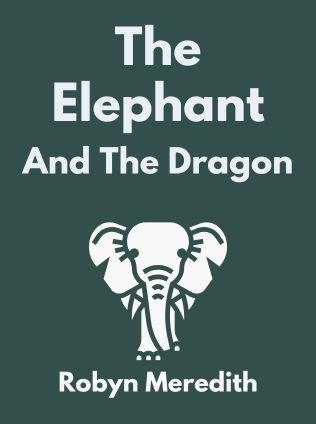
The Elephant and the Dragon
The Rise of India and China and What It Means for All of Us
By Robyn Meredith
Published 06/2008
About the Author
Robyn Meredith is a distinguished foreign correspondent for Forbes magazine, renowned for her incisive reporting on economic and geopolitical developments in India and China. Meredith's career includes a significant tenure at The New York Times, where she developed her investigative journalism skills. Her insightful perspectives are shaped by her experiences as an award-winning journalist and a Knight-Wallace Fellow at the University of Michigan. Residing in Hong Kong, Meredith is strategically positioned to observe and document the dynamic changes transforming Asia. Her book, The Elephant and the Dragon: The Rise of India and China and What It Means for All of Us, delves into the seismic shifts in global economics driven by the rapid development of these two nations.
Main Idea
The Elephant and the Dragon explores the transformative rise of India and China on the global stage, examining how their economic emergence is altering the world’s economic and political landscape. By integrating their vast labor forces with modern technology and global markets, these nations are reshaping how business is conducted globally. Meredith provides an essential guide to understanding these changes and offers insights on how Western countries can adapt and thrive in this new era.
Table of Contents
- Introduction: The Earth-Tilting Emergence of India and China
- Tectonic Economics
- Transformations
- Where Mao Meets the Middle Class
- From the Spinning Wheel to the Fiber-Optic Wire
- Made by America in China
- The Internet's Spice Route
- Opposite Approaches
- The Disassembly Line
- India's Cultural Revolution
- China's Consumer Market
- Geopolitics Mixed With Oil and Water
- A Catalyst for Competitiveness
- Expect Change
Introduction: The Earth-Tilting Emergence of India and China
The introduction sets the stage for the narrative by highlighting the profound impact of India and China’s rise. Meredith emphasizes the scale of transformation, noting how Western companies are not only hiring Indian and Chinese workers but also targeting these vast markets for their products. This dual approach is fundamentally altering the global economy and changing the way business is conducted worldwide.
Tectonic Economics
Meredith uses the term "tectonic economics" to describe the massive shifts in the global economic landscape driven by India and China. These changes are not just about offshoring jobs but about a complete transformation in how economies operate and interact. The ability to connect with cheap labor in India and China via modern technology has created unprecedented efficiencies and competitive pressures.
"The rise of India and China is causing the entire earth’s economic and political landscape to shift before our eyes." - Robyn Meredith
Transformations
The transformations in India and China are compared to the industrial revolutions in the West. Meredith contrasts India’s slow and steady approach with China’s rapid, almost meteoric rise. Despite their differences, both countries share a common trajectory of moving from developing nations to economic powerhouses.
"India’s slow-but-steady approach contrasts with China’s rocketlike rise." - Robyn Meredith
Where Mao Meets the Middle Class
This section delves into China’s transformation from Maoist policies to a burgeoning middle class under Deng Xiaoping. The shift from collectivized farming to a market economy has lifted millions out of poverty and created a new consumer market.
"Mao’s policies created a nationwide famine... Deng Xiaoping’s reforms shuffled China’s planned economy toward a market economy." - Robyn Meredith
From the Spinning Wheel to the Fiber-Optic Wire
India’s journey from Gandhian principles of self-reliance to a major player in the global economy is examined. Meredith discusses how India’s reintegration into the world economy has fueled infrastructure development and economic growth.
"India has been haunted by two lingering ghosts of the postcolonial period... Mahatma Gandhi’s anti-industrialization tenets and Jawaharlal Nehru’s socialism." - Robyn Meredith
Made by America in China
The phenomenon of Western companies using China as a manufacturing hub is explored. Meredith describes how the availability of cheap labor and the potential for revenue growth make China an attractive destination for manufacturing and selling goods.
"China amounts to a double dream for Western companies – corporate one-stop-shopping for both cost cuts and revenue growth." - Robyn Meredith
The Internet's Spice Route
India’s role as the world’s back office is highlighted, with millions of white-collar jobs being outsourced to the country. Meredith explains how this shift is transforming the Indian economy and creating new job opportunities both within and outside the technology sector.
"India is becoming the world’s back office." - Robyn Meredith
Opposite Approaches
Meredith contrasts the different developmental strategies of India and China. While China’s government-planned approach has turned it into a manufacturing giant, India’s more laissez-faire approach has made it a hub for white-collar work. Both paths, however, lead to rapid economic growth and increasing importance on the global stage.
The Disassembly Line
The traditional assembly line has evolved into a global supply chain, or disassembly line, where components of products are made in different countries. This approach maximizes efficiency and reduces costs, benefiting consumers worldwide.
"Henry Ford’s assembly line was shattered into a thousand pieces and scattered around the world." - Robyn Meredith
India's Cultural Revolution
India’s economic reforms are reshaping its society and culture. Meredith describes the changes visible in cities like Bangalore, where modern infrastructure and corporate campuses contrast sharply with the surrounding areas.
"Infosys’ Bangalore headquarters is to see not just the newly emerging India but also the entire global economy on the move." - Robyn Meredith
China's Consumer Market
As incomes rise, China is becoming a significant consumer market. Western companies are eager to tap into this market, altering traditional Chinese consumer behaviors and creating new economic opportunities.
"China is emerging as a giant consumer market." - Robyn Meredith
Geopolitics Mixed With Oil and Water
The industrial revolutions in India and China are increasing their demand for natural resources, leading to higher global prices and shifts in geopolitical alliances. The environmental impact of this rapid industrialization is also a major concern.
Sign up for FREE and get access to 1,400+ books summaries.
You May Also Like
Rich Dad Poor Dad
What the Rich Teach Their Kids About Money - That the Poor and Middle Class Do Not!
By Robert T. KiyosakiFreakonomics
A Rogue Economist Explores the Hidden Side of Everything
By Steven D. Levitt and Stephen J. DubnerI Am Malala
The Story of the Girl Who Stood Up for Education and Was Shot by the Taliban
By Malala YousafzaiFactfulness
Ten Reasons We're Wrong About the World – and Why Things Are Better Than You Think
By Hans Rosling



















